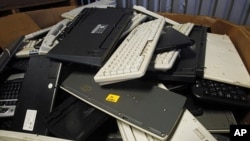West Africa’s mounting electronic waste, or e-waste, is presenting both opportunities and problems. The United Nations Environment Program is proposing better regulation to protect both human health and what is a burgeoning, valuable economy in recycled electronics.
From dead laptops to battered old refrigerators, West Africa’s lively economy in recycling electronics is growing fast. More and more old and broken electronics are being shipped to Africa. Consumer demand has risen across the world, generating a massive waste stream of such goods - which usually have a relatively short life span.
For years, Africa has been the recipient of near end-of-life electronic equipment imported onto the continent for refurbishment, recycling and further use - as well as illegal dumping.
“In Ghana our investigators found that about 70 percent of all the electronic equipment imported were used electronics," explained Michael Stanley-Jones, a U.N. public information officer for environmental issues.
"Thirty percent of those second-hand imports were non-functioning. They should have been classified as waste," he added. "But this is evidence that the import regime is not robust enough to capture this illegal transiting or trans-boundary movement of what is a hazardous product.”
Go to any large West African city and you might spot young boys picking through dumps and men stripping copper from old wires. Such goods contains a variety of metals and chemicals - some of them hazardous chemicals and substances such as mercury and lead; some valuable metals such as gold, steel, aluminum, copper and silver.
“They collect what they can easily receive value from and then they throw away everything else and that really creates environmental problems. And of course there is how they do it - there is very little respect for health and safety conditions for those workers," noted Tatiana Terekhova, a U.N. health officer. "They just burn the wires to recover the copper and there is a combination of dioxins and furans [toxins] which is a result of this practice.”
The value of this informal economy is difficult to gauge, although the formal and informal income of those engaged in the e-waste sector in Ghana is estimated to be between $106 million and $268 million per year.
Nowadays too, there is more and more e-waste being generated in West Africa itself, as domestic consumption of high-end electronic goods increases.
The United Nations Development Program studied five countries in the West African region - Benin, Ivory Coast, Ghana, Liberia and Nigeria. It found that between 650,000 and one million tons of domestic e-waste are now being generated each year
Katharina Kummer Peiry, executive secretary of the Basel, Rotterdam and Stockholm Conventions at the U.N.’s Environment Programme, says the real issue is one of regulation.
“You have the huge health problems and the environmental problems by e-waste not being treated and managed in a proper way - disposed of in communal dump sites," Peiry said. "And you have people, especially children, collecting them and dismantling them, and trying to extract materials in informal operations, backyard burning - which creates problems for the environment and human health. There are precious metals contained in them, so for examples as gold or copper and rare earth metals and those can be recycled and recovered. So there are two sides -- on the one hand the metals contained in them are very dangerous, on the other, some are very valuable.”
The U.N. Environment Program's Basel Convention has formally decided to support the economic opportunities generated by such e-waste - on the condition that such goods are dismantled and recycled properly. It believes that if shipments of e-waste do reach Africa, in-country authorities should have the right to send them back.
Katharina Kummer Peiry says the U.N. recognizes that the waste stream provides millions of jobs in the recycling sector.
“There is a bit of an anecdote related to this - as this has been a very contentious issue for years and countries have been very vocal in saying it is totally unacceptable to import waste into poor countries for illicit recycling and disposal," she noted. "Some years ago I had a discussion with a government official in one of those countries, now retired, who said, of course we need to say that this is unacceptable and we have to ban it but in reality if we were to do this, the next day we would have 100,000 people demonstrating in front of the Ministry of Environment that we were taking their jobs away, because there are millions of people living off this.”
The Basel Convention will develop a certification plan for e-waste recycling facilities, to ensure that the waste is treated in a proper manner and the economic opportunities are realized. It also proposes to strengthen the regime of customs and inspection in West Africa.
The Pan-African Forum on E-Waste will open on 14 March in Nairobi to address this issue.




